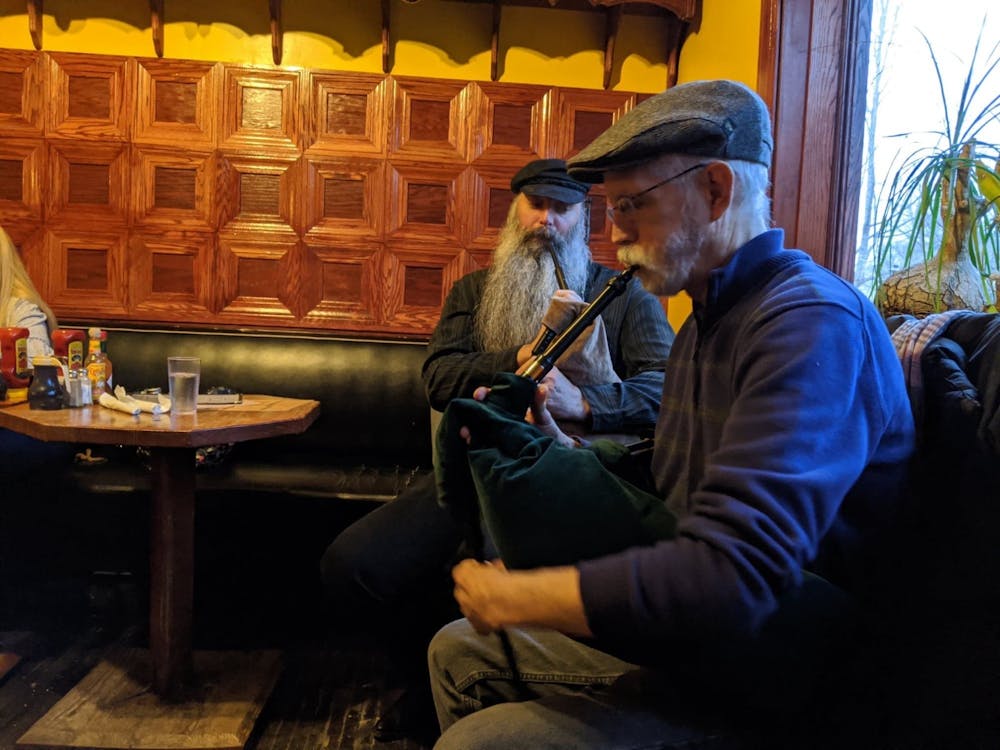When the sun is out, Bloomington resident Angus Burke practices his bagpipe skills in the Frank Southern Ice Arena parking lot.
“It’s a nice, big space where I can be mostly far away from people,” Burke said. “Even if people can hear me, it’s not overpowering.”
A member of the Bloomington, IN - What’s Going On? Facebook group heard Burke in the parking lot and posted in the group April 2, writing, “To the dude playing bagpipes in the parking lot of the Frank Southern Ice Arena: Won’t pretend I understand it, but I respect it.”
Burke, 30, started his bagpipe journey at age eight. He said his dad was focused on his Scottish heritage.
“He didn’t play the bagpipes, but he kind of always wanted to,” Burke said.
One day, his dad came home with a practice chanter, a woodwind instrument that acts as one of the attachments to a bagpipe.
“He gave that to me and said, ‘You’re starting lessons on Wednesday,’” Burke said.
He hasn’t stopped playing since.
Burke is one of many pipers, or bagpipe players, in Bloomington. Some share their music individually, and some are part of the Bloomington Pipers’ Society.
Burke, co-founder of the society, said the group offers get-togethers and practices for local bagpipe players as well as educational opportunities for the community. One program, the Beginners’ Circle, is for people starting with the practice chanter.
“All of our people on the practice chanters or very early on the pipes can get together and work through some challenges on their own,” Burke said. “It just allows them to kind of empower themselves musically.”
Before COVID-19, the society would perform once a month at Runcible Spoon in Bloomington, an event they call Pub Night, Burke said. The group has also performed for the Fourth Street Festival of the Arts and Crafts and for the educational program Lotus Blossoms through the Lotus Education & Arts Foundation.
The society has about a dozen members, Burke said.
Bloomington resident Clancy Clements, another member of the Bloomington Pipers’ Society, owns 13 sets of bagpipes. He plays six or seven on a regular basis.
Clements, an IU professor emeritus of linguistics, said he started playing bagpipes in 1999 while he was the director of the Madrid IU overseas study program. He said he learned guitar as a teenager, but he could no longer play due to joint pain. So he picked a new instrument.
Clements said he does not really know why the bagpipes appealed to him. He said he liked them, and they are not as common as other instruments.
“I guess you’d say it’s an exotic instrument,” Clements said. “The guitar you see everywhere. The bagpipes you don’t see anywhere.”
The bagpipes can be played in two ways, Clancy said. A piper can blow air through a blowstick or use the bellows. The chanter and drone are attached, and the sound is made from reeds inside them.
Clements is also a member of Daily Bread & Butter, a musical trio that plays traditional European dance music. The three members make music using a set of bagpipes, an accordion and a hurdy gurdy, or a string instrument from medieval France.
Clements said he thinks most enjoy the music.
“About 90 percent of the people that I encounter love the bagpipes,” he said. “Ten percent don’t like them at all.”
Bloomington piper Arle Lommel has played Hungarian bagpipes since 2005. He said he lived in Hungary at one point and picked them up there. The bagpipes have different tuning and are softer than Highland bagpipes, a type of bagpipes from Scotland. He watches the Bloomington Pipers’ Society but does not perform with them because he does not play Highland bagpipes.
Lommel would also play his bagpipes outside in areas such as the Bloomington Farmers’ Market and the IU campus. He said because of COVID-19, he has just been playing outside in his neighborhood on the outskirts of New Unionville.
“I’ve been going out and playing in the neighborhood, just as a way of bringing something novel and different into peoples’ lives so they’re not stuck hearing the same thing, doing the same thing day in and day out,” Lommel said.
He said most peoples’ reactions have been positive.
“The most striking one was a teenage girl who was out walking her dog and saw me and stopped,” Lommel said. “At the end, she said, ‘You’re the best thing that’s happened in quarantine so far.’”




